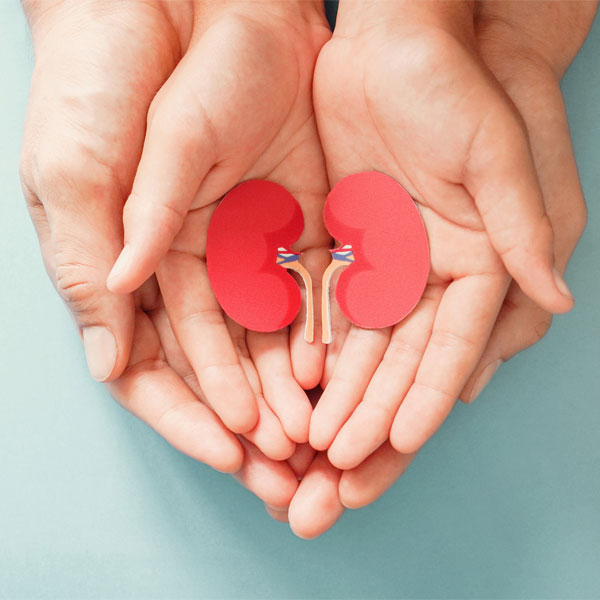Kidney disease is a major global health issue impacting more than 750 million individuals. The International Federation of Kidney Foundations and the International Society of Nephrology joined forces in 2006 to establish World Kidney Day, a worldwide venture to raise public awareness of the significance of kidney health and to lessen the incidence and effects of kidney disease and related health issues. This year’s slogan is ‘Kidney Health for All – Preparing for the unexpected, supporting the vulnerable.’
 Chronic kidney disease has no known cure. However, medical nutrition therapy may delay or stop the illness’ course and other catastrophic disorders from emerging. The diseased individual must alter their dietary intake to preserve the physiological function of their kidneys by limiting the nutrients mentioned below. A high-protein diet results in a considerable decline in renal function due to increased renal blood circulation and intraglomerular strain. In non-dialysis chronic patients lacking obvious heart disease or high blood pressure, the daily salt intake guidelines are 3 grams/day. In cases of high blood pressure, it is reduced to 2 grams/day. The Dietary Approaches to Stop Hypertension (DASH) Diet, recommended by the National Kidney Foundation, includes ample amounts of all food groups while limiting dairy to low fat. It is also low in sodium, added salt, sugar, fat and red meat. Daily fluid consumption of 1.5 liters is recommended to maintain appropriate hydration in the body, as dehydration may result from fluid intake restrictions, insufficient fluid ingestion due to taste alterations, usage of loop diuretics, and postoperative vomiting. While for advanced-stage patients, fluid intake is frequently restricted. Rapid weight reduction puts patients at risk of fractures and osteoporosis. The recommended intake of 1500–2000 mg of calcium (diet and supplements) and 3000 IU of vitamin D3 per day should be taken. Rich sources include dairy, eggs, nuts, and fish.
Chronic kidney disease has no known cure. However, medical nutrition therapy may delay or stop the illness’ course and other catastrophic disorders from emerging. The diseased individual must alter their dietary intake to preserve the physiological function of their kidneys by limiting the nutrients mentioned below. A high-protein diet results in a considerable decline in renal function due to increased renal blood circulation and intraglomerular strain. In non-dialysis chronic patients lacking obvious heart disease or high blood pressure, the daily salt intake guidelines are 3 grams/day. In cases of high blood pressure, it is reduced to 2 grams/day. The Dietary Approaches to Stop Hypertension (DASH) Diet, recommended by the National Kidney Foundation, includes ample amounts of all food groups while limiting dairy to low fat. It is also low in sodium, added salt, sugar, fat and red meat. Daily fluid consumption of 1.5 liters is recommended to maintain appropriate hydration in the body, as dehydration may result from fluid intake restrictions, insufficient fluid ingestion due to taste alterations, usage of loop diuretics, and postoperative vomiting. While for advanced-stage patients, fluid intake is frequently restricted. Rapid weight reduction puts patients at risk of fractures and osteoporosis. The recommended intake of 1500–2000 mg of calcium (diet and supplements) and 3000 IU of vitamin D3 per day should be taken. Rich sources include dairy, eggs, nuts, and fish.
The most recent dietary recommendations state that 15 mg of vitamin E, 5000 to 10,000 international units (IU) of vitamin A, and 90-120 g of vitamin K should be taken daily. Vitamin A should not be administered to chronic kidney patients in excess due to its negative association with glomerular filtration rate. It is better to use dietary sources such as carrots, melons, bell peppers, tomatoes, etc. Renal disease patients are highly sensitive to phosphate fluctuations in the blood. Kidney disease patients should limit their dietary intake to 800 mg of phosphate daily. Organic phosphate-containing meals (natural food sources) should be chosen above those that contain inorganic phosphate (i.e. processed foods/food additives).
Nauman Khalid, PhD.
Professor of Nutrition
College of Health Sciences
Abu Dhabi University
References:
- Beerendrakumar, N., Ramamoorthy, L., & Haridasan, S. (2018). Dietary and fluid regime adherence in chronic kidney disease patients. Journal of caring sciences, 7(1), 17.
- Cirillo, M., Lombardi, C., Chiricone, D., De Santo, N. G., Zanchetti, A., & Bilancio, G. (2014). Protein intake and kidney function in the middle-age population: contrast between cross-sectional and longitudinal data. Nephrology Dialysis Transplantation, 29(9), 1733-1740.
- Crews, D. C., Bello, A. K., & Saadi, G. (2019). 2019 World Kidney Day Editorial-burden, access, and disparities in kidney disease. Brazilian Journal of Nephrology, 41, 1-09.
- Fernandes, A. S., Ramos, C. I., Nerbass, F. B., & Cuppari, L. (2018). Diet quality of chronic kidney disease patients and the impact of nutritional counseling. Journal of Renal Nutrition, 28(6), 403-410.
- Jhee, J. H., Kee, Y. K., Park, S., Kim, H., Park, J. T., Han, S. H., & Yoo, T. H. (2020). High-protein diet with renal hyperfiltration is associated with rapid decline rate of renal function: a community-based prospective cohort study. Nephrology Dialysis Transplantation, 35(1), 98-106.
- Kalantar-Zadeh, K., & Fouque, D. (2017). Nutritional management of chronic kidney disease. New England Journal of Medicine, 377(18), 1765-1776.
- Ko, G. J., Obi, Y., Tortoricci, A. R., & Kalantar-Zadeh, K. (2017). Dietary protein intake and chronic kidney disease. Current opinion in clinical nutrition and metabolic care, 20(1), 77.
- Sugiura, T., Takase, H., Ohte, N., & Dohi, Y. (2018). Dietary salt intake is a significant determinant of impaired kidney function in the general population. Kidney and Blood Pressure Research, 43(4), 1245-1254.
